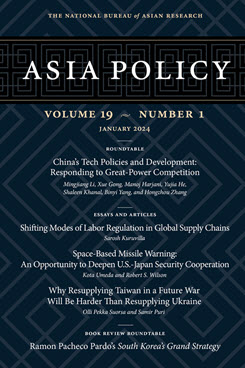Article in Asia Policy 19.1
Space-Based Missile Warning
An Opportunity to Deepen U.S.-Japan Security Cooperation
This article explores Japan’s pursuit of missile-warning satellites and the opportunity this presents for the U.S.-Japanese security partnership in space.
Executive Summary
MAIN ARGUMENT
In recent years, Japan has taken steps toward developing its own missile-warning satellites. Developing a space-based missile-warning system is a challenging feat, one that is complex and expensive, evidenced by the fact that only a few countries operate such systems. Given that the U.S. already shares some missile-warning information with Japan, Tokyo’s pursuit of its own satellites reflects, at least in part, the country’s push toward achieving a more independent capability. However, this push should not be construed as sudden or a shift away from its longtime ally. Rather, it represents (1) a continuation of latent historical efforts to acquire missile-warning satellites, and (2) a response to technological developments that have made potential adversarial missile systems more threatening and developing missile-warning satellites more feasible. Japan’s pursuit of missile-warning satellites fits within the country’s broader acceleration as a defense power and contributor to the U.S.-Japan security relationship. It also presents a compelling opportunity for more extensive collaboration between the two allies.
POLICY IMPLICATIONS
- Japan has had a long-standing interest in space-based missile-warning systems and more broadly in mitigating missile threats using space-based technologies. Even if Japan does not acquire these assets soon, the issue of whether to acquire them will continue to be central to its defense debate.
- Japan’s development of a space-based missile-warning system, alongside the U.S.’s development of its own next-generation missile-warning capabilities, could offer opportunities for heightened collaboration between the two countries. Partnering on these assets could lead to financial savings and the potential for the alliance to develop a better protected and more capable missile-warning architecture.
Kota Umeda is a Visiting Research Fellow at the Institute of Geoeconomics (Japan), where he focuses on Japanese space policy and U.S.-Japan space cooperation.
Robert S. Wilson is a Systems Director at the Aerospace Center for Space Policy and Strategy (United States). In this role, he leads work on international space topics, including Japan. His work has appeared or been covered in news outlets such as the Washington Post, the Financial Times, Politico, Kyodo News, Japan Today, and the Diplomat, among others.
About Asia Policy
Asia Policy is a peer-reviewed scholarly journal presenting policy-relevant academic research on the Asia-Pacific that draws clear and concise conclusions useful to today’s policymakers. Asia Policy is published quarterly in January, April, July, and October and accepts submissions on a rolling basis. Learn more


